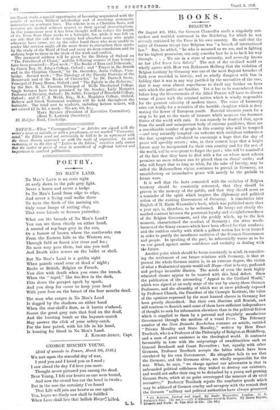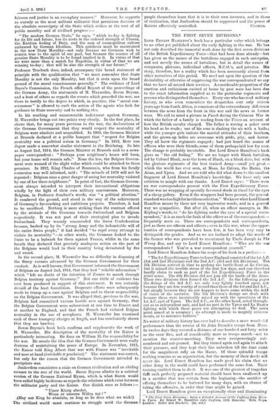BOOKS.
BELGIUM.*
ON August 4th, 1914, the German Chancellor made a singularly out. spoken and truthful statement in the Reichstag, for which he was severely criticized by the Press in his own country. He said that ths entry of German troops into Belgium was " a breach of international law." But, he added, " he who is menaced as we are, and is fighting for his highest possession, can only consider how he is to hack his way through. . . . We are in a state of necessity, and necessity knows no law (Not kennt Lein Gebot)." The rest of the civilized world so wholly agrees with Herr von Bethmann Hollweg that the violation of Belgian territory by Germany was one of the most flagrant breaches of faith ever recorded in history, and so wholly disagrees with him in holding that it was in any way justified by the necessities of the case, that it may seem almost superfluous to dwell any further on facts with which the public are familiar. Yet it has to be remembered that before long the Governments of the Allied Powers will have to discuss terms of peace with the criminal nation which is wholly responsible for the greatest calamity of modern times. The voice of humanity cries out loudly for a cessation of the horrible slaughter which is deci- mating the flower of European youth. Material interests yearn for a stop to be put to the waste of treasure which menaces the foremost States of the world with ruin. It can scarcely be doubted that, apart from the small and unimportant body of extreme pacificists, there are a considerable number of people in this country who will be tempted —and very naturally tempted—to welcome with credulous enthusiasm the first symptoms calculated to encourage a hope that the day of peace will speedily return ; who, in their earnest hope that a bright future may be inaugurated for their own country and for the rest of the world, will be over-prone to forget the past ; who will be unmindful of the fact that they have to deal with a foe on whose most solemn promises no more reliance can be placed than on dicers' oaths ; and who will forget that so long as what, for the sake of brevity, may bs called the Hohenzollern regime continues to prevail in Germany, an unsatisfactory or inconclusive peace will merely be the prelude to future wars.
It is well that the facts connected with the violation of Belgian territory should be constantly reiterated, that they should be graven in the memory of the public, and that they should serve as a reminder of the spirit which inspires the diplomacy and political action of the existing Government of Germany. A translation into English of M. Emile Waxweiler's book, which was published more than a year ago, is, therefore, to be welcomed. He brings out clearly this marked contrast between the persistent loyalty and straightforwardness of the Belgian Government, and the perfidy which, up to the last moment, characterized the conduct of Germany ; the utter worth- lessness of the flimsy excuses which have been offered for that conduct ; and the ruthless cruelty with which a gallant nation has been treated in order to gratify the inordinate ambition of the German Government and people. In speaking of the past, he inferentially warns us to b3 on our guard against undue confidence and credulity in dealing with the future.
Another point which should be borne constantly in mind, in consider- ing the settlement of our future relations with Germany, is that at present the whole German nation is, in an extreme degree, the victim of what a Brahminical mystic would call Maya—that is to say, profound and perhaps incurable illusion. The minds of even the most highly educated classes appear to be tainted with this fatal defect. Since the publication of the astounding "Appeal to the Civilized World," which was signed at an early stage of the war by ninety-three German Professors, and the absurdity of which was at once pitilessly exposed by Professor Church, the President of the Carnegie Institute, the value of the opinions expressed by the most learned classes in Germany has been greatly discredited. But their own illusions still flourish, and will continue to flourish until some of them have sufficient independence of thought to seek for information elsewhere than in the political fiction which is supplied to them by a paternal and singularly mendacious Government through the medium of a venal Press. The February number of the Neue Deutsche Rundschau contains an article, entitled "Private Morality and State Morality," written by Herr Ernst Troeltsch, who is a Professor of the Philosophy of Religion at Heidelberg, and a man of great eminence in the theological world. It contrasts favourably in tone with the outpourings of swashbucklers such as General Bemhardi and Count Reventlow ; but, equally with other Germans, Professor Troeltsch accepts the fables which have been circulated by his own Government. He altogether fails to see that the Germans, and the Germans alone, are wholly responsible for the war. What, he says, "we charge against our adversaries is that in unbounded political selfishness they wished to destroy our existence, and would not suffer their ring to be disturbed by a young and growing German State, which at no point overstepped the measure of its vital neeesaitits.'" ProfP•°;:t- Troeltsch rejects the conclusive proofs which may be adduced of German cruelty and savagery with the remark that the German "military and political authorities have always preserved • (1) Belgium, 4Yeutral and Loyal. By Emile Wexweller. London : 0. P. Pntnarn's Sons. 155. net.)—(2) L'Allentagne (Irani /a Game. By Baron Beim.
Dresses and rail': G. Van Oest et 41e. L. 8d.J fairness and justice in an exemplary manner." Moreover, he supports as warmly as the most militant militarist that pernicious doctrine of the absolute sovereignty of the State which strikes at the root of all public morality and of civilized progress :— "The modern German State," he says, "which to-clay is fighting for its life and future, has its roots in the ordered strength of Prussia, the Kantian feeling of Duty, and the sum of cosmopolitan culture embraced by German Idealism. This synthesis must be maintained in the new State Morality—not only because we Germans wish to remain true to the spirit of our past, but because the essence of all genuine State Morality is to be found implied in it. In virtue of that we were more than a match for Napoleon, in virtue of that we are winning to-day; that will be also the strength of our future."
Professor Troeltsch does, indeed, accompany this broad statement of principle with the qualification that "we must remember that State Morality is not the only Morality, but that it rests upon the broad ground of the moral consciousness generally." The evidence of Lord Bryee's .Commission, the French official Report of the proceedings of the German Army, the statements of M. Waxweiler, Baron Beyens, and a host of others as regards the events which preceded the war, are there to testify to the degree to which, in practice, this "moral con- sciousness" is allowed to curb the action of the agents who look for guidance to State necessity and to nothing else.
In his scathing and unanswerable indictment against Germany, M. Waxweiler brings out two points very clearly. In the first place, he shows that, for many years previous to the war, the declarations of the German Government that they would respect the neutrality of Belgium were absolute and unqualified. In 1905, the German Minister at Brussels declared at a public banquet that "respect for Belgian neutrality was a political axiom in Germany." In 1913, Herr von Jagow made a somewhat similar statement in the Reichstag. So late as August 2nd, 1914, the German Minister at Brussels said to a news- paper correspondent : "Perhaps your neighbour's house will burn, but your house will remain safe." None the less, the Belgian Govern- ment were warned of the slight value which could be attached to these promises. In 1912, King Charles of Roumania, who from his family connexion was well informed, said : "The miracle of 1870 will not be repeated : Belgium runs a great danger of seeing her neutrality violated by one of her three neighbours." In point of fact, the German Govern- ment always intended to interpret their international obligations wholly by the light of their own military convenience. Moreover, Belgium, in Professor Sombart's words, was "a political abortion." It cumbered the ground, and stood in the way of the achievement of Germany's far-reaching and ambitious projects. Therefore, it had to be sacrificed. Nothing is more striking than the contrast offered by the attitude of the Germans towards Switzerland and Belgium respectively. It was not part of their strategical plan to invade Switzerland. They warmly commended the Swiss Confederation because, backed up by its "strong Army and the indomitable will of the entire Swiss people," it had decided "to repel every attempt to violate its neutrality "—in other words, the Germans looked to the Swiss to be a bulwark for them against France, whilst in the same breath they declared that precisely analogous action on the part of the Belgians would lead to their country being devastated by fire and sword.
In the second place,. M. Waxweiler has no difficulty in disposing of the ffimsy excuses advanced by the German Government for their conduct. As is well known, that Government informed the Government of Belgium on August 2nd, 1914, that they had "reliable information" which "left no doubt of the intention of France to march through Belgian territory against Germany." Not one tittle of evidence has ever been produced in support of this statement. It was certainly devoid of the least foundation. Desperate efforts were subsequently made to trump up a case against Belgium and to throw responsibility on the Belgian Government. It was alleged that, previous to the war, Belgium hid committed various hostile acts against Germany, that the Belgian Government were subservient at one time to Franco and at another to England, and that the French had violated Belgian neutrality in the use of aeroplanes. M. Waxweiler has examined each of these trumpery charges at length, and has conclusively shown that they are baseless.
Baron Beyens's book both confirms and supplements the work of M. Waxweiler. His description of the mentality of the Kaiser is particularly interesting. He fixes on William II. the responsibility for the war. He scouts the idea that the German Government were really desirous of maintaining the peace of Europe. In November, 1913, the Kaiser told King Albert that war with France was "inevitable and near at hand (inevitable et prochaine)." The statement was correct, but only for the reason that the German Government intended to precipitate war.
Junkerdom constitutes a stain on German civilization and an abiding menace to the rest of the world. Baron Beyens alludes to a satirical version of the German National Hymn, which is what Bacon would have called highly luciferous as regards the relations which exist between the militarist party and the -Kaiser. One distich runs as follows :— " Unser 1Conig absolut, Wean er unseren Willen tut ! "
Olay our King be absolute, so long as ho does what we wish!) 'The civilized world must continue to struggle until - the German people themselves learn that it is in their own interests, and in those of civilization, that Junkerclom should be suppressed and the power of



































 Previous page
Previous page